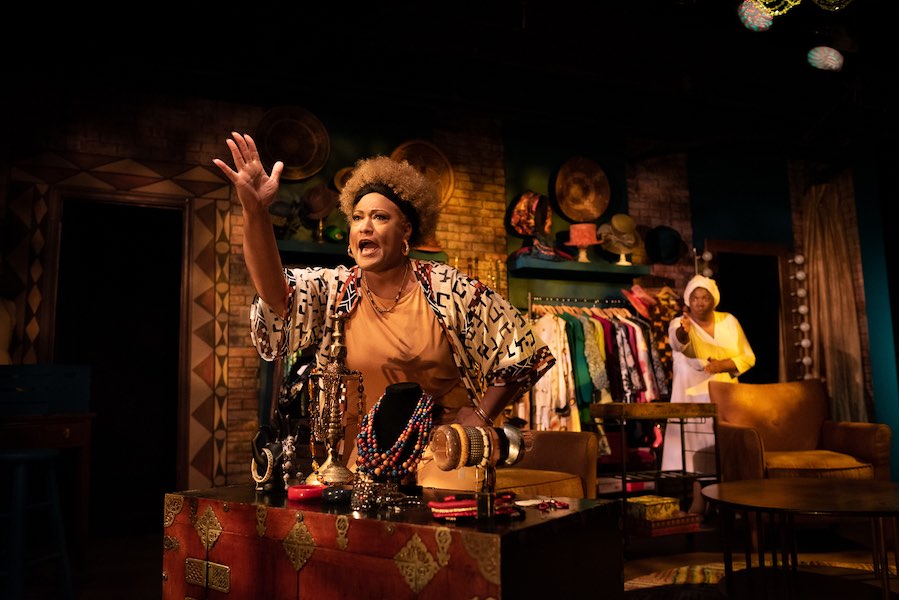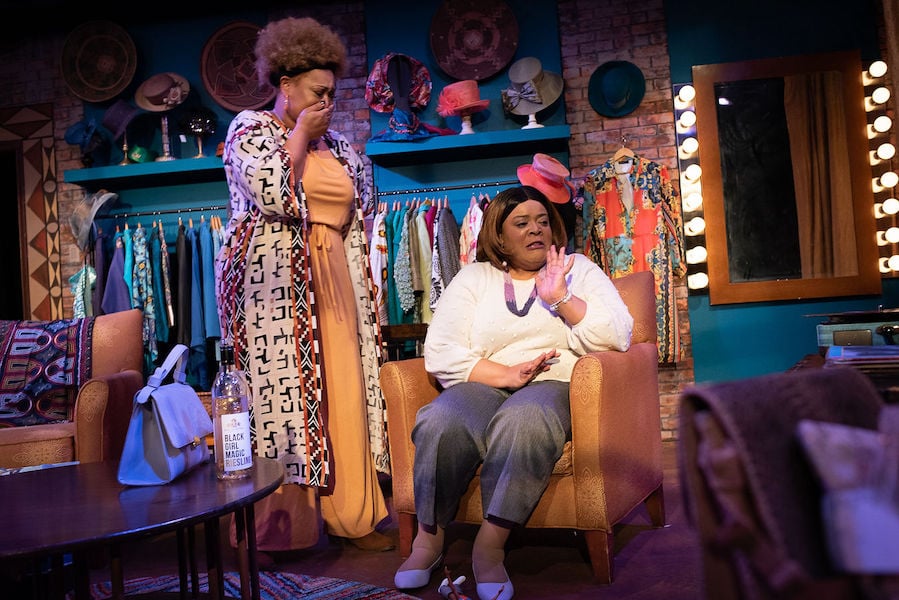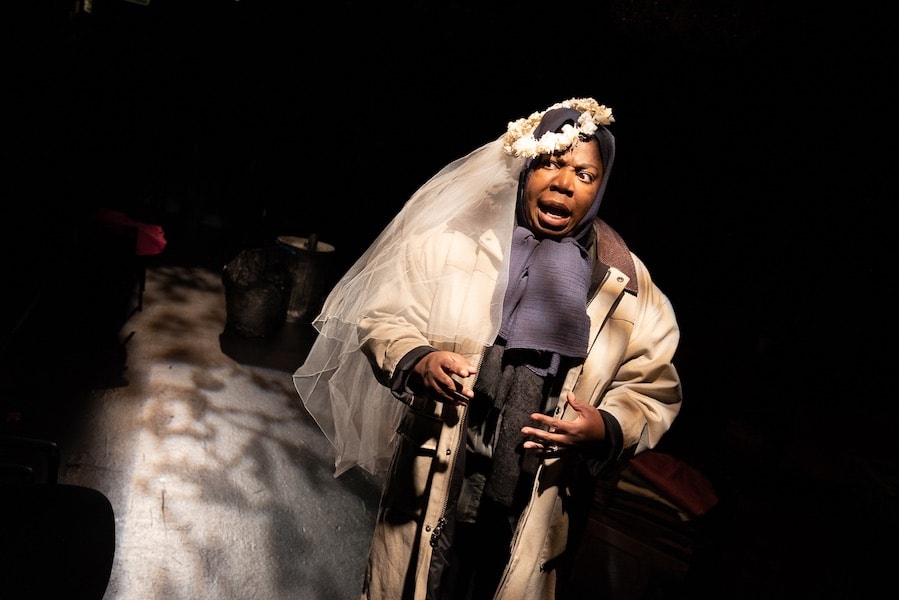It’s taken Iyona Blake seven turbulent years to transform Diagnosed from a one-woman play about a broken woman in a psych ward to a full vibrant village experience, and the investment of time and texture was well worth the wait.
Blake avoids the beauty salon cliché and selects the more culturally appropriate setting of a family-owned boutique to weave a colorful mosaic of modern-day African American drama queens seeking a missing accessory to complete a series of secondhand stories of trauma, grief, loss, and vanishing relationships.

Lydia the cultural keeper and boutique owner, played by DMV veteran Kandace Foreman, confidently projects the stylish sense of strength that masks a generational curse that is haunted by her mother’s mantra — “Perception Is Everything”!
The compelling theme that drives the dialogue of Diagnosed is an unvarnished view of the Black feminist experience with mental health, but Blake captures a subtle undercurrent of self-loathing that many Black women carry when grappling with the double co-morbidity stigma of obesity and the withering criticism from overbearing mothers and siblings that Lydia carried all her life and finally buried on her mother’s grave.
The rich new nuance of Diagnosed 2.0 is Blake’s inclusion of a contemporary professional Black woman who uses their personal position and power to declare and share their modern-day disability with their office mates, who are forced to confront the fact “That’s the first time I heard a sister talk about a shrink!”
Andrea Gerald brings a powerful penthouse attitude and a slick black Cleopatra wig to the boutique as Penny, the short-fused professional who rummages through a dozen racks to find something to match her red-hot manic mood, which seemed to be triggered by the ever-present bottle of wine.

What follows is a procession of spiraling monologues by abandoned would-be wives — Ida played by Theresa Cunningham — and childhood sexual assault victims — Simone played to an authentic emotional crescendo using dolls to re-enact her abuse by Corisa Myers — and “hurt-people-hurt-people” abusers such as Wanda, the psycho property manager played by Ria Simpkins, who was a little too over-the-top.
The youngest member of the ensemble, Sophia Early, delivers a disturbingly authentic performance of Mia the suicidal college student who is rescued from the brink of suicide by a call from her father as she counts her meds and obsesses on the number 16 in a textbook case of obsessive-compulsive disorder.

The seven characters had a shadowy feel of a for colored girls who have considered suicide/when the rainbow is enuf formula that detracted a little from bringing the play to a more satisfying close.
Lydia as the tribal leader never seemed to connect the characters and bring a healing resolution full circle despite the culturally appropriate use of wandering ancestors and a side stage musical undercurrent of Tracy Francis as the Drummer and the unspoken final character of the drum as a symbolic call to the ancestors to heal and forgive her mother or any of the other loyal patrons of the boutique.
“Being labeled crazy, bipolar, nuts or the girl whose elevator doesn’t go all the way up to the top floor” is the collective mantra of the Diagnosed support group.
Kudos to the creative team for transforming the intimate black box Cay Wiant Theater space into a warm and lushly authentic boutique. They included Laura Connors Hull, Founding Artistic Director and Producer; Nicholas Goodman, Stage Manager; Margie Jervis, Set Designer; Cidney Forkpah, Costume Designer; Nina Stephens, Wig Designer; and Tiffany Quinn, Choreographer.
The playwright correctly advises the audience that the sensitive content of the creative collaborative is not intended to provide medical advice, diagnosis, or treatment, but an impressive offering of mental health resources for Black women is included in the playbill, and mental health therapists are scheduled to lead post-show discussions on seven of the three-week run’s performances.
Running Time: One hour and 30 minutes with no intermission.
Diagnosed plays through March 5, 2023, at Creative Cauldron, 410 S Maple Ave, Suite 116 Falls Church, VA. Purchase tickets (Tier One $45, Tier Two $35, Students $20) online or by calling 703-436-9948.
Diagnosed will also stream Saturday, March 4, at 7:30 PM. Tickets ($15) are available online.
Post-show discussions will be held on Friday and Saturday evenings and Sunday matinees.
This production contains material on suicide, sexual assault, depression, and other references to mental health disorders that may act as triggers. Diagnosed is intended for mature audiences only.
COVID Safety: Audiences are required to wear masks for this performance. See Creative Cauldron’s complete COVID-19 Theater Protocols.
SEE ALSO: ‘Diagnosed’ at Theater Alliance (review of a workshop production by Malcolm Lewis Barnes, August 18, 2019)




